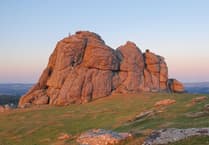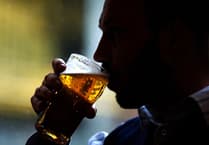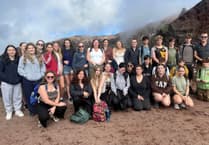A RECENT “Evening of Devonshire Custom and Song” with Jim Causley and folklorist Mark Norman hosted at Crediton Library has been instrumental in kickstarting the formation of a new special collection looking at Devon Folklore within the Folklore Library and Archive.
Around 50 people enjoyed an evening hearing about the customs, traditions and legends of Devon and listening to local songs and stories.
The Folklore Library and Archive is a donation-funded organisation housed within Crediton Library which aims to collect, preserve and make available for the future folklore materials in all forms – written, audio, video and physical items.
It has an extensive reference library of folklore books and holds many special collections of national and international importance.
With the introduction of the Devonshire Folklore Collection, the aim is to gather and preserve for the future a large bank of materials on the county, its social history, traditions, superstitions, rural living and more.
This will be made freely available for people to consult both online and in the archive.
The Library and Archive is now looking for help from anyone with Devon connections in gathering and building the collection.
Library and Archive curator, Mark Norman, explained: “We have such a rich history and heritage in Devon of the ways that we lived, worked and played; what we believed and the customs that we took part in.
“But so much of this material is in danger of being lost forever.
“The aim of the Devonshire Folklore Collection is to stop this happening.”
By way of comparison, Mark explained about the sad loss of Cornish folklore and history materials drawn together over decades by collector Barbara Spooner.
“Barbara Spooner amassed boxes of material – handwritten notes, stories she was told, articles she collected and so on.
“But she had made no provision or left any instructions as to what should happen to them on her passing away.
“Consequently, with no immediate family involvement, the local council cleared her house when she died and everything ended up in landfill.
“All of that material was lost forever.”
There are many ways that people can help to save Devon material.
If you have surplus to requirements books, photographs or items that document Devon’s traditional past, then you can donate them to the Library and Archive.
If you have family photos, video recordings or audio or documents which are important to you, they can be digitised and made available for viewing.
The originals can then be returned to you, along with complimentary digital copies.
“One of the most important things that people can do,” Mark told us, “is to talk to people. Friends, family, members of local groups.
“Everyone can do this.
“If you have a mobile phone or other device that records audio, then record the conversation.
“We have volunteers who will transcribe audio for us, so we can give you written versions back too.”
Any recorded conversations can be made available for others to listen to and learn from with suitable permissions, and the Library and Archive have easy forms which can be completed to do this.
The Folklore Library and Archive is currently in the process of moving materials which it has already digitised to a new online future-proofed delivery system, which is used by thousands of archives internationally such as the Met Office and the National Archives.
Via this, you can listen to audio, watch video or read documents held in the archive.
Links can be found on the Folklore Library and Archive Website at: www.folklorelibrary.com .
Local groups with important materials can also get in touch to discuss the preservation of materials which fit the Devonshire Folklore Collection remit. Many local history groups have paper archives in cupboards and boxes, but no easy way to make them more available to the public.
The Folklore Library and Archive can help with this and will be delighted to discuss ideas with groups.
If you would like to submit materials, discuss how you can help with the project, or find out any more information please either email: [email protected] or visit the Folklore Library and Archive in Crediton Library during normal opening hours.





Comments
This article has no comments yet. Be the first to leave a comment.